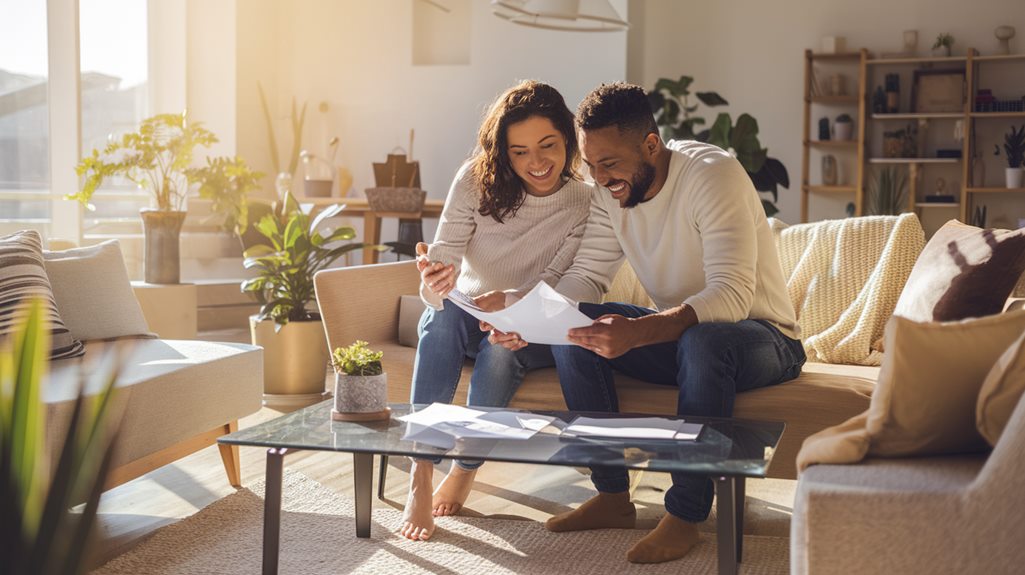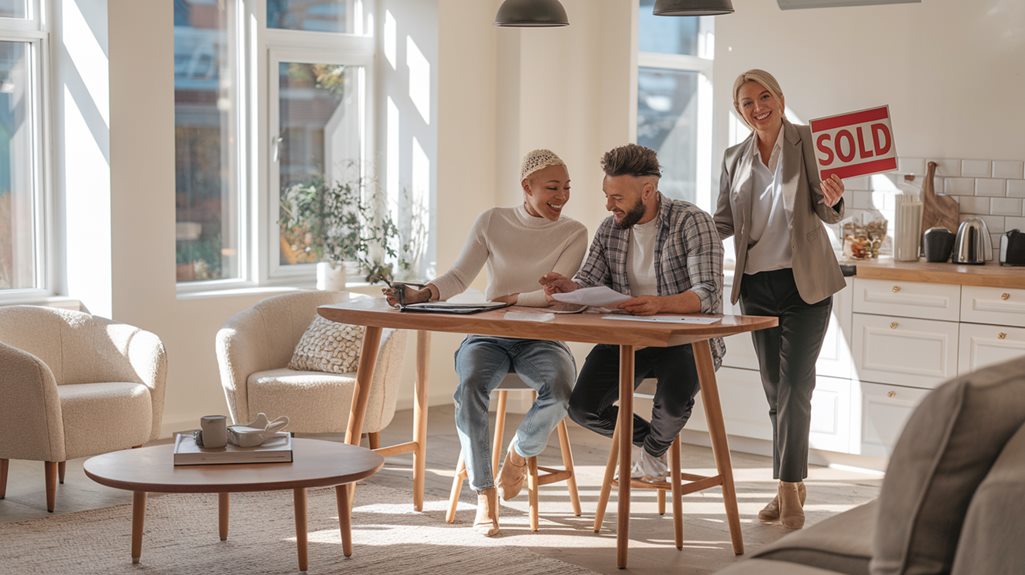Buying your first home is exciting! Start by checking your money situation. Look at your credit score and how much you've saved.
Next, learn about different types of mortgages. Some have fixed rates, and some have adjustable rates. It's good to compare these and see what lenders offer.
Get pre-approved for a loan. This helps you know your budget and shows sellers that you're serious.
Make a list of what you need in a home. Think about important things like location and how the area might grow in the future.
It's smart to work with real estate agents. They know a lot about the market and can help you negotiate better deals.
Always have a thorough inspection done on the home. This can help you find any problems and can help with negotiations too.
Don't forget about closing costs! Learn what they usually are and what they include.
There are many tips to make your home-buying journey smooth and easy.
Ready to start building equity in your own Michigan home? Get your personalized home loan quote today.
Assess Your Financial Health

It's really important to know how you're doing with money before you buy a home. Start by checking your credit score. This number helps banks decide if they'll lend you money for a house and what interest they'll charge.
Next, set some savings goals. It's good to have a plan for how much money you want to save. Make a budget to help you see where your money goes each month.
Also, try to pay off any debts. This way, you won't have too many bills to pay, and you can buy a home more easily. Having money saved for emergencies is smart, too! This money helps if something unexpected happens and you need to pay for it.
Think about your money plans for the future. Make sure your job is steady, so lenders know you can pay your mortgage on time.
Michigan residents, unlock the door to your new home. Request your home loan quote from Treeside Financial today.
Understand Your Mortgage Options
Choosing a mortgage can feel a bit confusing at first, but don't worry! With some helpful tips, you can make the right choice. Here's what you need to know:
- Fixed Rates vs. Adjustable Rates: Do you want a steady payment every month, or would you like a payment that can change? Think about what feels best for you.
- Loan Terms and Interest Rates: Look at how long you'll pay the loan and how that affects how much you pay each month.
- Mortgage Insurance: Find out if you need insurance for the loan. This can depend on how much money you put down.
- Lender Comparison and Government Programs: Check out different lenders. Some might've special programs to help you find the right loan.
With these tips, you can feel more sure about your mortgage choices!
You might be closer to buying your home than you think
Take our 2-minute home buyer readiness quiz to see how prepared you really are – no credit check required.

Get Pre-Approved

Before you start looking for a house, it's really important to get pre-approved for a mortgage. This helps you know how much money you can spend and shows sellers that you are serious. First, check your credit score because it affects the interest rates you can get. Lenders will look at your money situation to see what kind of loans you can have, which helps you understand your choices. When you have pre-approval, you can act fast when you find the right home.
Here's a simple chart to help you:
| Factor | Importance | Impact on Pre-Approval |
|---|---|---|
| Credit Score | High | Changes interest rates |
| Loan Types | Different | Shows what you can choose |
| Financial Health | Very important | Decides if you can get a loan |
Talk to lenders who get your needs. This way, you'll feel more at home in your home-buying journey.
Prioritize Your Needs
When you start looking for a home, it's important to think about what you really need. This will help you find a good place to live.
Here are some simple steps to help you:
- Home Features: Think about what you want in your new home. How many bedrooms do you need? Do you want a backyard?
- Location Preferences: Where do you want to live? Is it close to your job, schools, or places to catch a bus or train?
- Community Feel: How does the neighborhood feel? Do you think you'd be happy living there?
- Future Growth: Look at how home prices in the area have changed. This can help you know if your home will be worth more in the future.
Work With a Real Estate Agent

When you know what you want in a home, working with a real estate agent can make the process easier and more fun! They know a lot about the market and can help you find the right neighborhoods, prices, and homes that fit what you're looking for.
Agents are great at helping you understand everything, and they can help you negotiate so you can make good choices.
It's really important to talk with your agent during this time. By being open and honest, you can tell them exactly what you need in a home. This way, they can look for places that are just right for you.
Working together with your agent makes you feel more connected, as you search for a community that feels like home. Trust your agent! They want to help you find the perfect place with confidence and ease.
Conduct Thorough Inspections
If you're buying a home for the first time, it's really important to look for problems that might cause trouble later.
When you hire a professional inspector, they can check everything closely. This helps you know how the house is doing.
Checking things out first can help you avoid big surprises and give you a better chance to negotiate a good price.
Identify Potential Issues
Before you sign on the dotted line, it's really important to check the house carefully to find any problems. A home inspection is a great chance to see if there are any hidden issues that could make living there harder or cost you money later.
Here are some common things to look out for:
- Roof Condition: Check if there are missing shingles or water damage. This can lead to big repairs.
- Foundation Issues: Look for cracks or if the house seems to be sinking. This can mean there are serious problems.
- Plumbing Concerns: Look for leaks, water spots, or old pipes. These can affect how good your water is.
- Electrical System: Make sure the wires are safe and can handle what your home needs.
Finding these problems early helps you choose wisely, making sure your new home is a safe place to live.
Hire Professional Inspectors
Getting help from professional inspectors is a very important part of buying a home. It helps you avoid big surprises that could cost you a lot of money.
When looking for an inspector, check that they've the right training and experience. Knowing how long the inspection will take helps you plan and gives you time to understand the report. This is important for making smart choices during negotiations.
Even though paying for an inspection might feel like an extra cost, it can show you how much the home is worth and what repairs it might need later. This information can really help you when talking to the seller.
Remember, sellers have to fix some problems too, and you can talk about these issues based on what the inspection finds.
In the end, spending money on a professional inspection helps you make better decisions when buying a home.
Prepare for Closing Costs

When you're getting close to buying a home, it's really important to know about the extra costs you'll need to pay when you close the deal.
These costs can include things like loan fees, title insurance, and property taxes. They can add up to about 2-5% of the amount you're borrowing.
If you plan for these extra costs, it will help you move into your new home without any surprises that could make you worry about money.
Understand Closing Expenses
When you're getting ready to buy your first home, it's really important to know about closing expenses. These costs can surprise you, so it's good to understand them.
Here are some things to think about:
- Loan Origination Fees: This is the money you pay to the bank for helping you get a loan. You should look at these fees from different banks to find the best deal.
- Title Insurance: This helps protect you if someone claims they own your home. It's important to know why you need it and how much it costs.
- Appraisal Fees: This is a fee for someone to check how much the house is worth. You have to pay for this, and it's a must-do.
- Inspection Fees: It's smart to have someone check the house for problems. Spending money on this can help you avoid big troubles later.
When you understand these costs, you'll feel more ready to buy your home and happy to be part of your new neighborhood.
Budget for Additional Fees
Before you buy a home, it's important to think about extra costs that can come up when you close the deal. These extra fees can catch first-time buyers off guard, but if you plan ahead, you can make the process easier.
Closing costs usually range from 2% to 5% of the home's price. These costs can include things like inspections, title insurance, and legal help.
Make sure to learn about your local market so you know what fees to expect. Talk to your real estate agent and lender. They can help you understand these costs better.
When you plan for these extra fees, you'll feel more confident about your choice and ready to enjoy your new neighborhood!








